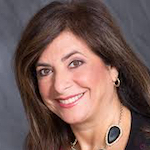 |
| Wendy Lund |
The COVID-19 pandemic has challenged us to think about health in new ways.
When the stay-at-home orders started, and doctors’ offices and hospitals filled with patients in need of urgent care, it may have initially seemed safer to delay or reschedule routine checkups and screenings. Even the medical community sent mixed messages early on, advising people to keep only critical appointments and suggesting that non-essential cancer screenings be postponed.
Now—approximately six months into this global health crisis—the medical community is predicting a rise in cancer rates due to preventative screenings that have fallen through the cracks during the shutdown.
Troubled by this news and recognizing the potential long-term implications it could have for health systems, GCI Health and HealthyWomen teamed up in July to explore how women were approaching their preventative care during the pandemic. This next phase of #BeHealthiHer, which launched in 2017 in partnership with Prevention magazine, is focused on making health a priority for women across generations by reminding them that taking care of yourself isn’t selfish.
| This article is featured in O'Dwyer's Oct. '20 Healthcare & Medical PR Magazine (view PDF version) |
To understand how many women were delaying or missing important appointments, GCI Health, HealthyWomen and Prevention conducted a survey, “Stay Healthy in 2020,” which revealed that the preventative care issue had deeper roots than anticipated. The majority of women (70 percent) weren’t getting regular screenings for health conditions like cancer and heart disease, even before the onset of COVID-19.
Fueled by these findings, #BeHealthiHer Now is issuing a call-to-action to reinforce the urgency and importance of preventative care and encourage more women to focus on their immediate health and book appointments for screenings.
Stay Healthy in 2020 looked into what was keeping women from scheduling the preventative screenings they need to maintain good health and found three primary factors trending across all ages and races. One in four women noted that healthcare costs or lack of insurance were the main barriers, especially for Black women, reinforcing significant racial disparities in access to preventative care.
An additional 25 percent of women said they didn’t think preventative screenings were necessary for them, with the highest numbers (41 percent) among women ages 65 to 74, a group highly likely to need screenings.
Women also cited schedules packed with family and work obligations, with the highest numbers (38 percent) among 18- to 24-year-olds. This reinforced findings from previous #BeHealthiHer surveys, in which most women (77 percent) said their job schedule prevented them from booking regular screenings, and those working in healthcare marketing and communications fields reported strikingly high levels of stress.
In addition to uncovering barriers to preventative care at the individual level, the Stay Healthy survey also provided insights into broader trends that could impact women’s health in 2020 and beyond. While telemedicine has made it possible to connect virtually with doctors and care teams, the remote health platform also poses hurdles for some women.
Appointments that don’t require diagnostic tests can easily be adaptable to telehealth, but in-person visits are still necessary for many preventative care screenings, such as mammograms, gynecologic screenings, colonoscopies, blood work and blood pressure monitoring.
Further, the survey found that women’s levels of comfort navigating telemedicine varied by age and generation. While many women (42 percent) have engaged with telehealth, the highest group was those between the ages of 18 and 24 (57 percent), with the lowest numbers (36 percent) among those over 75. In the younger group, 65 percent felt they got the same quality of care compared to in-person visits, while only 45 percent of the women over 75 felt that way.
Mental health emerged as another area for concern, with 36 percent of women surveyed saying they have increased their alcohol consumption since the start of the pandemic. Given the link between alcohol consumption and certain cancers and health conditions, there’s reason to be concerned about whether these could manifest without regular health screenings.
Overall, the biggest mental health concern was worry over someone in their family getting the virus (23 percent), consistent with our previous findings that women are putting themselves after everyone else. The lowest concern was being stressed about a health condition that could have been prevented or treated differently (three percent), which further indicates women are not concerned about missing preventative care.
On a more positive note, the arrival of a vaccine for COVID-19 could potentially help restore some semblance of normal life. Many of the women (58 percent) surveyed said they plan to get the vaccine as soon as it becomes available, including 64 percent of women over 55 and 74 percent of those between 18 and 24.
However, given the pharmaceutical industry’s speed in developing a viable vaccine, the window to generate support for universal vaccination is relatively small and closing quickly. If enough people aren’t vaccinated, the public health gains could be much smaller than expected. This will require ongoing education, encouragement and engagement across the healthcare industry.
Despite all the uncertainty in the world today, #BeHealthiHer Now wants to remind women that when it comes to taking charge of their health and holding their loved ones accountable for doing the same, there’s no better time than the present.
The goal is to provide tips, inspiration and expert advice to help them get healthier, stay healthier and live more vital lives. For example, many women may not be aware of the screenings they should be getting at what age. #BeHealthiHer Now is offering resources to remind women when the right time is to get important screenings for conditions such as hypertension, various types of cancers, thyroid disease and bone mineral density.
As communicators, we can play an important role in raising awareness about the necessity of preventative care and inspiring women to prioritize self-care, for themselves, for their families and for society. It’s time that more women realize that taking care of themselves is as important as taking care of others and put themselves at the top of their list of priorities.
***
Wendy Lund is CEO of GCI Health.


 Lo Isidro, senior director at Real Chemistry with more than a decade of strategic communications and PA experience, has joined Narrative Strategies.
Lo Isidro, senior director at Real Chemistry with more than a decade of strategic communications and PA experience, has joined Narrative Strategies. Nelson Fernandez, former North American chair of APCO Worldwide and managing director of Burson-Marsteller, has joined Volunteers in Medicine Berkshires as director of communications and PA.
Nelson Fernandez, former North American chair of APCO Worldwide and managing director of Burson-Marsteller, has joined Volunteers in Medicine Berkshires as director of communications and PA. Lilit Bargar, who was most recently an EVP in the healthcare practice at Weber Shandwick, comes on board at GCI Health as EVP, corporate practice lead.
Lilit Bargar, who was most recently an EVP in the healthcare practice at Weber Shandwick, comes on board at GCI Health as EVP, corporate practice lead.
 Five ways that successful thought leaders are made.
Five ways that successful thought leaders are made.


 Have a comment? Send it to
Have a comment? Send it to 
No comments have been submitted for this story yet.